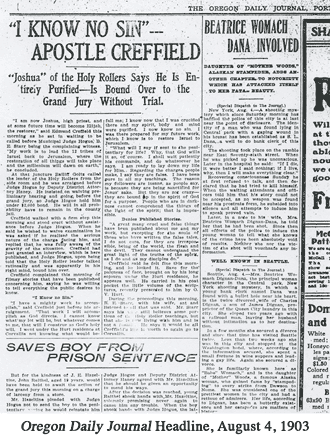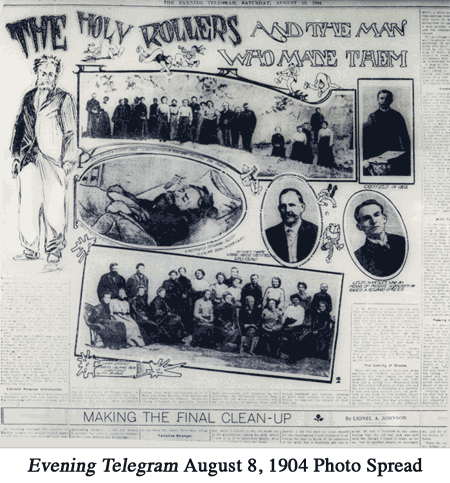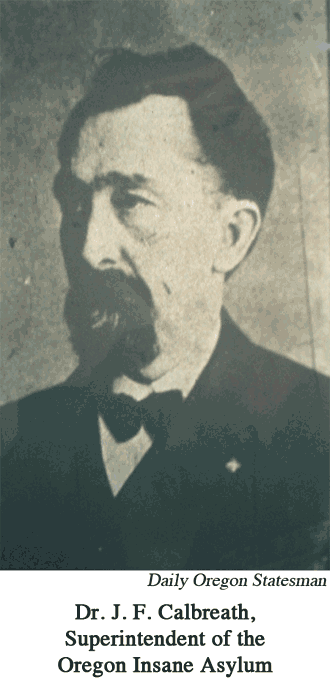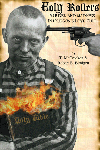Holy Rollers: Murder and Madness in Oregon's Love Cult
by T. McCracken and Robert B. Blodgett
CHAPTER ELEVEN
God Will Plead My Case
 ***
***
I KNOW NO SIN”--APOSTLE CREFFIELD
Headline, Portland Oregon Daily Journal, August 4, 1903
***
“I am not crazy; I am Elijah!” Creffield said to the ministers of the Gospel who visited him at the jail.
“Get that notion out of your head that you are one of God’s pets,” the Reverend J. Vertteig said. “It is that idea which has brought you where you are, and the sooner you are rid of it the better for you.”
Raising himself from the cot he was lying on, Creffield propped his head on one hand, and in the strongest voice he had used since his capture said again, “I am not crazy; I am Elijah.”
But what of the other Elijahs? the ministers of the Gospel wanted to know. What of men like John Alexander Dowie of the Christian Catholic and Apostolic Church in Zion? Dowie said he too had advanced to the position of prophet, was now “Elijah the Restorer,” and he too believed that God had given him the authority to ordain and direct apostles. Dowie was claiming that at any time--perhaps even now as they spoke--he was about to be promoted to “Prophet of the Restitution of all things.”
Can’t these ministers see that John Alexander Dowie is a fake while I am not? Are they soft in the head?
 “I am not crazy; I am Elijah,”
Creffield repeated. “There are many impostors”--“For false Christs and false
prophets shall rise, and shall shew signs and wonders, to seduce, if it were
possible, even the elect”--Mark 13:22.
“I am not crazy; I am Elijah,”
Creffield repeated. “There are many impostors”--“For false Christs and false
prophets shall rise, and shall shew signs and wonders, to seduce, if it were
possible, even the elect”--Mark 13:22.
“To every new Elijah, every other one is an impostor,” the Daily Journal commented. “To this extent they are right.”
When Sheriff Word came to take Creffield to court on Monday, Word found him lying on his cot studying a Bible, a Bible that had just been given to him by--of all people--O. V. Hurt. O. V. had been on his way to see his daughter Mae at the Boys’ and Girls’ Aid Society and decided to stop and check in on his son-in-law. Creffield had wanted a Bible, so O. V. gave him one. It was the Christian thing to do, and O. V. was a Christian in all senses of the word.
“How are you feeling this morning?” the sheriff asked Creffield.
“I feel better than I did when they found me under the house,” he said. “I think that I shall get well. Of course, if I am to die, I shall die, but I feel better this morning than I have for a long time.”
Creffield leaned against the jail bars and gripped them to steady himself. When he spoke, he spoke without his usual fire. But this enhanced his current status as martyr.
“Are you surprised to find yourself in this place?” he was asked.

“I am in God’s hands. He will protect me from this poor benighted people. Let His will be done.”
For his arraignment he donned not only a blue serge suit--O. V.’s Bible visibly sticking out of one of the pockets--but shoes, black ones. He did go hatless, however.
He was so weak that when he didn’t have Bailiff Goltz propping him up as he walked, he had to support himself against a wall. He looked pitiable. Spectators in the crowded courtroom could but wonder what there was about him that made people follow him. How could such a pathetic-looking man gain so much control over people--people like the rest of them, intelligent, well-adjusted people from good homes, people of “a sane mind and a reasonable being”? How could he cause them to forsake their families and be locked up in the loony bin? He didn’t look like anyone’s idea of Elijah. Hell, he didn’t even look like a street preacher who could distract you for more than an instant.
Not able to stand unaided, Creffield leaned against a desk while Deputy Prosecuting Attorney Haney read the charges against him: “Edwin Creffield is accused of the crime of adultery . . . ”
Edwin Creffield? Not Edmund Creffield? As was stated at the beginning of this story, little is known about Creffield’s early years . . . not even what his parents named him. Although his legal name was probably Franz Edmund Crefeld, Edmund Creffield is the form most often found in newspaper accounts. Edwin Creffield is the name that appears on his court and prison records, but four other agencies that kept records on him listed his name four other ways: Edmond Crefeld, Franz E. Crefield, F. E. Crefeld, and Edmund Crefield. He never seems to have corrected anyone about what people called him. Maybe it didn’t matter to him. These were temporal names. History would remember him as God’s Elect, Joshua the Prophet, the Second Savior, or Elijah.
Anyway, the charges against “Edwin Creffield” continued:
The said Edwin Creffield, on the 28th day of February, A. D. 1904 in the County of Multnomah and State of Oregon, then and there being, did then and there unlawfully and feloniously commit the crime of adultery with one Mrs. D. Starr, a female person, she the said Mrs. D. Starr then and there being a married woman and the wife of one B. E. Starr, and he the said Edwin Creffield not being then and there the husband of said Mrs. D. Starr.
“How do you plead?” Creffield was asked.
“Not guilty,” he whispered.
He spoke so softly that Haney had to repeat the answer to Judge Hogue.
With a slight wave of his hand Creffield added: “God will plead my case. I need no lawyer.”
“You had better secure someone on earth to defend you--I’m afraid I can’t hear God,” Judge Hogue quipped. “Do you realize that this charge is a serious one; that there is strong feeling against you and that if the allegations made are true you will go to the penitentiary?”
“I understand it.”
“And you want no attorney?”
“No, God will not justify me to have one.”
“How do you expect to receive justice without a lawyer?”
“God will be with me all the time. If he desires to have me found guilty, I shall receive it joyfully.”
Creffield said that, according to the promises in the Acts of the Apostles, the Holy Spirit would tell him what to say in court--“And they were all filled with the Holy Ghost, and began to speak with other tongues, as the Spirit gave them utterance”--Acts 2:4.
And if he were found guilty and sent to the penitentiary?
“God wills it so, of course,” Creffield said. “I shall wait patiently His commands, and do whatsoever He says. I am ready to lay down my life for Him.”
 Did he know that many people
believed he was insane, and that he might be examined by the
sanity commission?
Did he know that many people
believed he was insane, and that he might be examined by the
sanity commission?
This apparently was news to Creffield. “God usually tells me everything that is going to happen, and this is the first time He has failed to inform me,” he said. After a bit more reflection he concluded: “If God had wanted me to know, He would have told me.”
“I do not think there is a bit of doubt that Creffield is insane,” Deputy District Attorney Haney said. “I am of the opinion that the case will never come to trial, but that he will be sent to the asylum.”
“Poor, poor people! They are in the dark,” Creffield said of those who thought he was not right in the head.
Creffield waived his right to a hearing, wanting to take his case before a grand jury.
When brought before the grand jury, Creffield again pleaded “not guilty.” Bail was set at $2000, and since he was penniless--God was his lawyer, but not his bail bondsman--Creffield had to stay locked up for six weeks while he awaited trial.
He quickly adapted to jail life--not surprising for someone who had spent four months in a small hole under a house. When he first arrived, every other prisoner within shouting distance of his cell yelled curses, accusations, and sarcastic jibes at him. Soon, though, Creffield’s charisma came into play and he charmed them all--even his jailers, who considered him a “model prisoner.”
“I have no feeling of animus toward anyone,” Creffield said. “I love all men with a divine love. Not as the world loves, but with a divine love. If they were to sentence me for life, hurt or kill me, I would still love them. All hatred has left me, but the world cannot understand this.”
Creffield didn’t charm them as he had charmed God’s Anointed--folks at the jail didn’t think he was the Second Savior, by any means--but within days he went from being one of the most reviled men in the jail, not to mention all of Oregon, to one treated with respect--and even good humor.
They all had a good laugh when a company in San Francisco sent him a letter asking him to try their nerve tonic. The company had read that after Creffield was first arrested, he “was a complete wreck, both physically and mentally,” and his “nervous system was shattered.” Their tonic, they assured him, was “the best in the world and will cure anything.” Everyone agreed that if any one didn’t need nerve tonic, it was Edmund Creffield.
On account of his physical condition, if not his peculiar position in the world as Second Savior, Creffield wasn't put to work while he was in jail. He was allowed to remain in his cell during the day reading his Bible and holding conferences with his attorney, the Lord.
He rose every morning at half past six and ate a breakfast of potatoes, beef, gravy, and coffee. At noon he ate a light lunch of tea and bread, and for supper he, like all the prisoners, ate pork and beans.
Ten days before his trial Creffield asked Jailer Grafton questions about the penitentiary at Salem. Were preachers permitted to visit convicts? Were Bibles and religious tracts allowed?
“What do you want to know all this for?” Grafton asked. “Do you expect to go there?”
“Well, if God so wills it, I suppose I must accept my fate,” Creffield said.
Besides, if he were sentenced to the penitentiary, he would in a sense be nearer to his flock who were still locked in the asylum. The penitentiary and asylum were situated close to one another, and the brick walls of both institutions were visible to the inmates of each.
My people are being persecuted: they have been unjustly imprisoned in asylums for the insane [Creffield said] They were not given fair trials, and the physicians who examined them for their sanity were not competent to judge. It is persecution, 20th century persecution, if you will, but persecution just the same. They are as sane as I am. . . .
The reason my followers are insane, as people say, is because they are being sanctified for Jesus’ sake. They are not crazy--they are bound up in the spirit of God for a purpose. People who are in darkness cannot comprehend the things of the light of the spirit; that is impossible.
And back at the asylum, the authorities were currently dealing with a plan of theirs that had misfired. They had decided not to tell Creffield’s flock--his people who were being persecuted unjustly--about their leader’s arrest. The authorities assumed that since his people didn’t trust them anyway, they wouldn’t believe them--they would think it was some sort of trick. Better for his people to hear the news from other patients. The doctors also thought that Creffield’s arrest would be taken by them as proof that their leader, Creffield, was not God’s exclusive messenger.
But insane people do not act in predictable ways--that’s one of the reasons they’re considered insane. Not only did Creffield’s capture not cause disillusion among his people, his people were now more resolute than ever. “Stick fast to the faith!” was their mantra. They credited God with Creffield’s timely rescue from a seemingly inevitable death from starvation, once again showing Creffield’s personal connection to the Almighty.
J. F. Calbreath, the asylum’s superintendent, also now informed O. V. Hurt that his wife, Sarah, was hopelessly insane.
***
For many shall come in my name, saying, I am Christ; and shall deceive many.
Matthew 24:5
![]() Chapter 10: Creffield is Found and Arrested
Chapter 10: Creffield is Found and Arrested
***
Some of the newspaper articles that are sources for this chapter:
July 1904: Creffield is Found & Arrested***
Chapters from
Holy Rollers: Murder & Madness in Oregon's Love Cult
Part 1: The Seduction
Chapter 1: Trust Me, Brothers And Sisters
(Life Before Creffield [B.C.])
Chapter 2: God, Save Us From Compromising Preachers
(Creffield's Preachings)
Chapter 3: The Flock
(Profiles of the Holy Rollers Were)
Chapter 4: The Holy Rollers
(Things Start to Get Wild on on Kiger Island)
Chapter 5: Housecleaning
(There's a Sacrificial Bonfire)
Chapter 6: Community Concerns
(Officers Visit)
Chapter 7: Esther, The Chosen One
(Creffield Plans to Marry 16-Year- Old)
Chapter 8: Tar and Feathers
(The Men of Corvallis Act)
Chapter 9: Sane People Don’t Go Bareheaded
(Holy Rollers are Committed to the Asylum)
Chapter 10: More Beast Than Man
( Creffield is Arrested)
Chapter 11: God Will Plead Creffield's Case
(Creffield in Court)
Chapter 12: Scandal
(Shocking Testimony at the Trial)
Chapter 13: Calm Before the Storm
(The Holy Rollers Resume their Lives)
Chapter 14: Giving Up The Ghost
(Men are Gunning for Creffield)
Part Two: The People V. Creffield
Chapter 16: The Widow Creffield
Chapter 19: An Inherited Streak of Insanity
Part Three: The Madness
Chapter 23: Seeking Reconciliation
Chapter 24: Another Holy Roller Page One Murder
Chapter 25: What Can Papa Do For You?
Chapter 26: Human Life is Too Cheap In This Community
Chapter 30: The Final Chapter
(What Happened to Everyone Afterwards)
The Epilogue
(Heaven's Gate)
Newspaper Articles about Creffield & the Holy Rollers
1897-1903: B.C. (Before Creffield)
October to December 1903:Holy Rollers Burn Furniture & Pets
January to March, 1904: Holy Rollers Tarred and Feathered
April to June 1904: Holy Rollers are Committed to the Asylum
July 1904: Creffield is Found & Arrested
September 1904: Creffield's Trial
April 1906: Men are Gunning For Creffield
May 1906: Creffield is Murdered, Murderer is Considered a Hero
May 1906: Holy Rollers Found Starving Near Heceta Head
June 1906: George Mitchell's Trial Begins
July 1906: Hurt Testifies of Debauched Wife and Debased Sisters
July 1906: Esther Mitchell Kills Her Brother
August to October 1906: Seattle Prepares for another Big Trial
November 1906: Maud Hurt Creffield Commits Suicide
April 1909-August 1914: Esther Leaves the Asylum
1953 Stewart Holbrook's Murder Without Tears
1951Startling Detective Magazine, Nemesis of the Nudist High Priest
***
